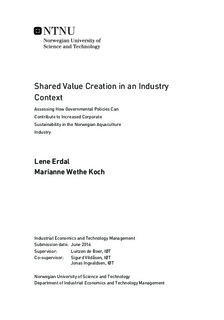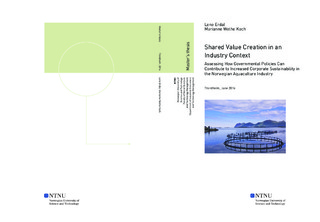| dc.description.abstract | We argue in this thesis that the concept of shared value creation introduced by Porter and Kramer (2011) contain weaknesses when it comes to providing guidance for how industries can achieve shared value creation. An analytical framework which adapts the concept into an industry context is therefore developed in this thesis, where four aspects, namely innovation, long-term orientation, cooperation and stakeholder trust, are found to be crucial. Furthermore, the authorities are argued to have a particularly important role in facilitating shared value creation in industries through the implementation of regulatory frameworks.
The analytical framework is furthermore applied to the Norwegian aquaculture industry in order to investigate how the industry can become more corporate sustainable. The Norwegian aquaculture industry is currently experiencing severe sustainability challenges that need to be overcome if the industry is to realize growth, in which shared value creation emerges as an important measure.
Two research questions associated with how shared value creation can be realized in the Norwegian aquaculture industry are answered in the thesis. The first research question identifies the current barriers to shared value creation in the industry, while the second research question determines how governmental policies can help the industry to overcome these barriers. The research questions are answered through a qualitative case study of the development licenses, in which 12 semi-structured interviews with different industry stakeholders are conducted.
Several barriers are found to prevent the Norwegian aquaculture industry from creating shared value, and the development licenses are further found to overcome some of these barriers. However, a substantial amount of barriers are still seen to be present after the implementation of the development license policy. The policy is thus found to come short in facilitating shared value creation in the industry, and propositions for how governmental policies can better facilitate shared value creation in the industry are provided. We furthermore argue that governmental regulations alone do not have the potential of overcoming all of the barriers to shared value creation, and aquaculture companies must take several measures for the industry to achieve shared value creation.
Another important aspect to consider is whether the framework would be applicable in other industry contexts. When addressing this concern, the validity of the analytical framework was found to be strengthened as the presumptions of the framework was consistent with the empirical data from the analysis. | |

